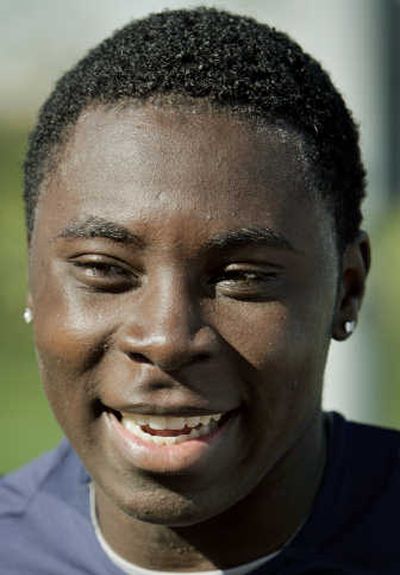Adu has learned tough lessons

EAST RUTHERFORD, N.J. – It would be wrong to lay all the blame at the young feet of Freddy Adu.
Adu did what most 14-year-olds would have done had you told them they were the next great thing and reinforced their egos by signing them to a multimillion-dollar contract.
His head swelled. He listened to what all the adults around him said and bought into his own hype.
Why should we have been surprised?
Adu had barely reached puberty when people anointed him the savior of United States soccer. He was going to be America’s Pele, Beckenbauer and Cruyff rolled into one.
He was going to raise the profile of American soccer and possibly even find time to still go to his high school prom.
But in 2004 when Adu signed with Major League Soccer, he wasn’t ready to handle the scrutiny, pressure and demands that went with becoming the youngest American athlete in 100 years to sign a professional sports contract.
No matter how gifted he was with a soccer ball, Adu still had the maturity level of a 14-year-old and he was expected to compete like men five, 10, 15, even 20 years older.
“I’ve had to learn the hard way, so to speak,” said Adu, now 19 and revitalizing his star with Benfica of the Portuguese Liga. “I had to be humbled. I’ve learned you just have to keep working hard every day and basically keep your mouth shut.
“For me, I think things are finally starting to work out in my favor, and hopefully it will stay that way.”
Adu wasn’t a bad apple during his 31/2 seasons with D.C. United and Real Salt Lake of MLS. He just sometimes handled situations like what he was – a child.
He had the brashness, impatience and arrogance of a teenager who had been handed a gross level of entitlement by being told he was special.
His play was solid, but Adu occasionally responded the way children do when they don’t get their way – with impatience and brashness. Sometimes he took his complaints public, hardly endearing himself to his coaches and teammates.
The question was: How much would Adu’s lack of maturity affect the development and growth of his game?
Adu’s tendency to want it all right now likely delayed his introduction to the senior national team.
Historically, when he entered a game against Canada at age 16 in 2006, Adu became the youngest player capped in United States soccer.
But the United States Soccer Federation was cautious with Adu, who had just two caps in 2007. They had him play with the Under-20 and Under-23 (Olympic) teams, making him earn his way to the senior team rather than have it gifted to him.
Adu did that last summer with his strong play in the FIFA Under-20 World Championships in Canada. He was transferred to Benfica for $2 million almost immediately after the tournament.
Even with Adu, now a part of the 2008 senior player pool, there seems to be reluctance to give him too much too soon.
In the United States’ three-match exhibition series against England, Spain and Argentina, Adu showed flashes of his potential as a creator. He looked like a player who could make an impact for the United States as it begins qualifying for the 2010 World Cup on Sunday against Barbados.
He will have that chance, since he has been named to the 21-man roster for the two-game Barbados series.
Still, USA coach Bob Bradley was tempered in his appraisal.
“We see everything,” Bradley said. “We see the moments that are special, and when Freddie has the ball in the attacking part of the field he is capable of doing some great things.
“But we’re also making sure he understands there is more to the game than that. When he comes into the national team, (Adu) understands that when he walks in the door, nothing that has been said about him, written about him means anything.
“The only thing that matters is that he can show the rest of these guys that when the games get very hard that he can help our team be successful. He understands that.”
The move from Real Salt Lake to Benfica changed everything.
In Portugal, it didn’t matter who people said Adu was. In a European league, he was just another young player trying to earn his place. Nothing was given to him.
“The grind over there … I learned how hard it is to really get a place on a team,” said Adu, who scored three goals in 11 appearances for fourth-place Benfica. “It’s regardless of who you are. You have to earn it every day.
“I’ve taken on a new mentality. Now, every time that I get on the field, I don’t care if it is one minute, 10 minutes, 30 minutes or 90 minutes, I’m going to go out there and work my butt off to help the team.
“Because you never know when you are going to get that opportunity again. That’s something I’ve learned.”